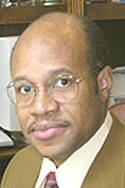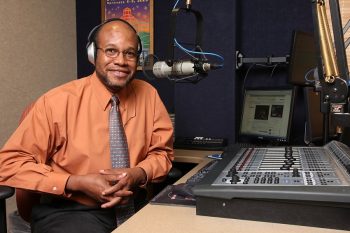Hope
 |
| Dr. Errington Thompso |
I just finished watching the History Channel’s two-hour documentary on Martin Luther King narrated by Tom Brokaw. It was extremely well done but… something was missing. There were interviews from civil rights activists like Representative John Lewis, Ambassador Andrew Young, and Martin Luther King, III, along with thoughtful commentary from contemporary activists including President Bill Clinton, Bono, Forest Whitaker, Jr., and Secretary of State Condoleezza Rice, who grew up in Birmingham.
The program was
like a wonderful BBQ sauce that tastes great but is missing some key
ingredient or ingredients that give the sauce a pizzazz. That’s what
was missing! Pizzazz! In spite of that, I highly recommend it.
As I sit here in my house, in a nice suburban neighborhood, in Arden,
North Carolina, I am dictating this column into my Dell computer using
sophisticated (translation: expensive) speech-to-text software. I
mention this because it takes some capital to do what I’m doing —
capital that, in the 1960s, 99% of black Americans didn’t have. My
world has been made possible by the sacrifice of Martin Luther King and
tens of thousands of others. I’ve attended some of the best schools
that our nation has to offer. I have worked at some of the best
hospitals because of those who’ve come before me (like my father who
was also a doctor). For this, I am forever indebted and grateful.
Think for a second of the things that we take for granted; think of
simple things that, 40 years ago, we couldn’t do in some places in
America. A couple of months ago, the father of my best friend from
college died in Birmingham, Alabama. I drove from North Carolina to
Alabama and never once thought about driving through the “wrong
neighborhood.” I stayed in a nice hotel, in one of the best rooms. My
friend and I ate at several restaurants while I was in Birmingham, and
never once did we have to wonder if we were going to be served.
Much has changed, yet much has stayed the same. My friend’s mother
lives in an area of Birmingham that is predominantly black and
predominantly poor. While the median income in the United States was a
little over $48,000 in 2006, the median income for blacks was only
$31,969. This gap between white Americans and black Americans is real,
and it’s widespread.
During the last several years of his life, Martin Luther King talked
about the poverty that was gripping the inner city. He went to Memphis
to support striking garbage workers, and I’m sure that those garbage
workers now get better pay and better working conditions than they did
in the late ‘60s. Back then, Memphis had a poverty rate of 60%; now the
poverty rate is down to “only” 25%. Think about that: Twenty five
percent of the city’s inhabitants still live below the poverty line.
And, of course, this number is higher in the black community: thirty
percent of blacks live below the poverty line.
The 50th anniversary of Brown v. Board of Education passed a couple
years ago. In an interview, one of the attorneys in that case argued
that we asked for the wrong thing. He said we asked for equality when
we should’ve asked for excellence. In my opinion, we should’ve asked
for both. In the years since, our nation has established an educational
system that is not separate but is (relatively) equal. Now, if you live
in the inner city, everyone, black or white, gets the same mediocre
education. If you live in an exclusive suburb or your parents have the
money to send you to an exclusive private school, your education is
probably pretty good.
When I look back over the civil rights movement, it appears that we
have fallen asleep over the last 20 years, lulled to sleep by the gains
of our forefathers. We have not marched to make sure that we are
getting a living wage for all city employees. Only a very few have
spoken out about our abysmal graduation rates in our high schools. No
Child Left Behind is a great slogan but a terrible policy. We need a
movement to change these policies and to change Washington from a city
that works for the rich to a city that works for everyone.
We must remember that Martin Luther King was only one man. The civil
rights movement included millions of people. The people who marched
from Selma to Montgomery. The people who marched in Washington.
Hundreds, thousands, millions of people — that was the power of the
movement. King’s message was the cherry on top of the cake.
Recently, I’ve begun to see another significant movement of the people.
Millions of people backing one man with a message. With over 200,000
people donating to his candidacy, he raised over $40 million last
month. This is people power. His message is hope, hope for better wages
and an affordable college education, hope for a future that is better
than the past. He seems to understand the power of the people. He seems
to understand that in order to bring real change to America, we need
more than a few politicians and a few lobbyists in the room making
decisions.
We need someone who will truly represent the people, who continues to
represent the people after being elected. Is Barack Obama that kind of
man? I think so, though I don’t know for sure. What I do know is that
we need another war on poverty. We need an educational system that
truly prepares our children for college. We need to give everybody —
every child, every adult, of every age and background and race, an
opportunity to succeed. In other words, we need to offer every American
a reason for hope.
Wasn’t that Dr. King’s central message? A message of hope? Now, I
understand that equating Barack Obama to Martin Luther King has
multiple problems. First of all, I would not want to pressure Barack
Obama with that analogy. More importantly, Barack Obama is his own man.
And his message, too, is a simple one: The audacity of hope.
Dr. Errington Thompson is a critical care trauma surgeon, author, and talk show host. Listen to the Errington Thompson Show – Saturdays, 9 a.m. EST, Air America – Asheville, NC,
880 the Revolution.







